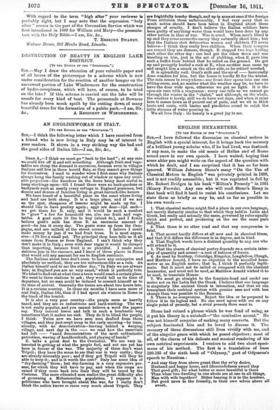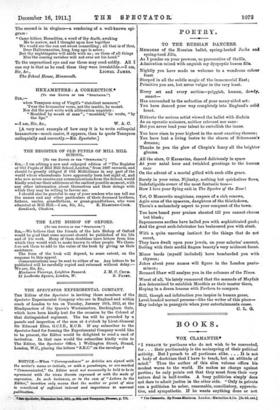ENGLISH HEXAMETERS. [To TTIE EDITOR OF THB "SPECTATOR."]
have followed the discussion on classical metres in English with a special interest, for it brings back the memory of a brilliant young scholar who, if he bad lived, was destined, if any man, to make the old music of Hellas and of Rome sound anew in our own speech. I have waited, hoping that some abler pen might write on the aspect of the question with which he dealt, and I am surprised that it has so far been ignored. William Johnson Stone's essay "On the Use of Classical Metres in English" was privately printed in 1898, and is not readily accessible ; but it was reprinted in full by Mr. Robert Bridges in his book "Milton's Prosody" in 1901 (Henry Frowde). Any one who will read Stone's Essay in that book will find it hard to resist his conclusions. Let me state them as briefly as may be, and as far as possible in his own words :-
1. That classical metres might find a place in our own language, not merely distantly similar to that which they held in Latin and Greek, but really and actually the same, governed by rules equally strict and perfect, and producing on the ear the same pure delight.
2. That there is no other road and that any compromise is fatal.
3. That accent hardly differs at all now and in classical times, and that if it differs the difference is in degree, not in kind.
4. That English words have a distinct quantity to any one who will attend to it
6. That the charm of classical poetry depends on a certain inter- play of quantity and accent—a sort of balance of forces. 6. As used by Southey, Coleridge, Kingsley, Longfellow, Clough, and Matthew Arnold, I have no objection to the so-called hexa- meter as an English metre; that is, I think it perfectly legiti- mate. But it must not be called or compared with the classical hexameter, and must not be used, as Matthew Arnold wished it to be used, to translate Homer.
7. We must go straight to the fountain-head and model our metre not on the Latin but the Greek. I believe that our language is singularly like ancient Greek in intonation, and that we can transplant their metrical system with greater ease and with less change than was possible to the Romans.
8. There is no compromise. Reject the idea or be prepared to follow it to its logical end. No one need agree with me on any single point of prosody, but a strict prosody there must be.
Stone had coined a phrase which he was fond of using, as it put his theory in a nutshell—" the combative accent." He was not himself sanguine of making many converts. But the subject fascinated him and he loved to discuss it. The memory of these discussions still lives vividly with me, and of the singular grace with which he posed objectors ; most of all, of the charm of his delicate and musical rendering of his own metrical experiments. I venture to add two short speci- mens of his method. The first is a translation of lines 180-185 of the sixth book of "Odyssey," part of Odysseus's
speech to Nansicaa :
"And may they from above grant thee thy ev'ry desire, Husband and happy home, and likemindedness award they That good gift ; for -what better or more beautiful is there Than when two dwelling in one abode are at one in all things, Man with wife together? Bitter hearing it is to the loveless, But good news to the friendly, to their own selves above all
sweet. The second is in elegiacs—a rendering of a well-known epi- gram:
"Came hither, Herselitus, a word of thy death, awaking Me to sorrow, and I thought upon how together
We would see the sun out sweet counselling ; all that is of thee, Dear Halicarnassian, long, long ago is ashes ;
But thy nightingales will abide with us ; on them of all things Else the coming ravisher will not ever set his hand."
To the unpractised eye and ear these may read coldly. All I can say is that as he read them they were irresistible.—I am,



















































 Previous page
Previous page